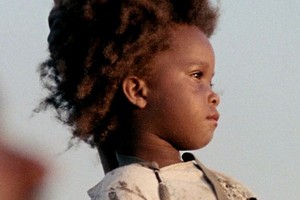Stuart:
Benh Zeitlin’s debut feature has been met with almost universal acclaim, and with good reason. Beasts of the Southern Wild is a stunningly original, bold and touching vision that has been quite rightly described as a ‘live action Miyazaki film’. I personally would like to see it described as ‘Tideland meets Razorback‘, but I fear that this would turn audiences away rather than attract them.
Set in the ‘Bathtub’, a community of fringe dwellers on the Louisiana Delta, we’re speedily introduced to a very different way of life. Six year old girl Hushpuppy (Quvenzhané Wallis) and her father Wink (Dwight Henry) live in shacks constructed from junk, surrounded by a menagerie of animals, both edible and companionable. Her father’s mortal enemies – those responsible for the industry and ‘progress’ beyond the levee – are despised by the local folk, but it’s the changes in the environment that will threaten their very existence as the waters rise.
Her father’s mortal enemies – those responsible for the industry and ‘progress’ beyond the levee – are despised by the local folk, but it’s the changes in the environment that will threaten their very existence as the waters rise.
Infused with a palpable sense of place, the film’s images feel constantly dirty and/or soggy. Despite the denizens of the Bathtub living in what might seem to many viewers as squalor, we quickly gain an appreciation of the community and their traditions. This is the type of film that really made me think about the way in which I live. I’ve never really thought of myself as being lucky in this particular regard, but if you don’t conform to the Western status quo, then you’re constantly besieged by the majority who want you to. The perils of hegemony ring loud and true here.
This film of course wouldn’t have worked without the brilliant young Wallis as Hushpuppy. Present in every single scene, this is her story, filled as it is with equal parts naïveté, intelligence, despair and hope. All the other performers are just as good, and you could easily be mistaken for thinking you’re watching a documentary.
If all that weren’t enough, you’ve got the presence of the prehistoric critters known as aurochs. I’m sure many will debate the significance of their presence, but they are brought to life with a wonderful collection of cinematic techniques and, like Where the Wild Things Are, a conspicuous absence of distracting CGI. The score is also brilliant, courtesy of Dan Romer and director Zeitlin.
As the credits rolled, one person behind me in the cinema complained that the whole experience was thoroughly depressing, and some may indeed find this to be true. Don’t worry that it will be a piece of cinema akin to the likes of Gummo, however; this is audacious, unapologetic and life affirming filmmaking. A piece of magic realism not to be missed.
Rating: